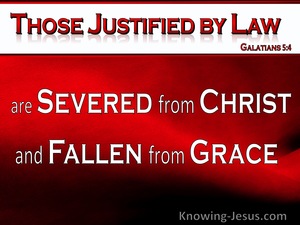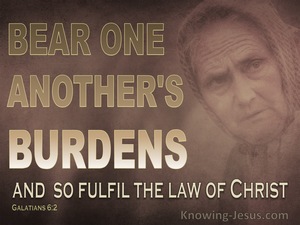◄ Galatians Devotional Commentary ►
Galatians 1:1
Paul had a unique ministry to the Gentiles. He was the only apostle that was called by the risen, ascended, and glorified Lord Jesus and by God the Father. Paul was given the profound mystery that has been kept hidden for ages and generations. He was the man chosen to make known among the Gentiles the glorious riches of this mystery, which is Christ in you the hope of glory.
He was not appointed during Christ's earthly ministry, read more...
Galatians 1:2
The books of Romans and Galatians are complementary. The former is a comprehensive discourse on the foundational doctrines of the Christian faith, rooted in the gospel of the grace of God. It was sent to the Church in Rome and teaches salvation is by grace alone through faith in Christ, which has set us free from slavery to sin through the fleshly works of the Law.
The epistle to the Galatians was sent to all the believers in read more...
Galatians 1:4
Paul was not ashamed of the gospel of Christ for he knew that it is the power of God unto salvation for all who believe. Paul received revelation of the gospel of grace directly from God, not from the twelve apostles or from any other eye-witnesses of Christ's earthly life.
But just as it is today, there were those in Paul's time who questioned his authority because he did not receive the gospel he taught from Christ's apostles. read more...
Galatians 1:6
Paul does not pull his punches when he challenges the Galatian believers on their readiness to depart from the unchangeable truth of God's Word to a false gospel. He marvels at the rapidity with which they turned from the glorious gospel of God's grace: "By faith alone in Christ's finished work at Calvary," to a different gospel which was not an optional alternative, but a totally false gospel. This was a departure from the truth which was leading read more...
Galatians 1:7
Paul taught the Galatian believers that salvation is from the Lord and that it is received as a free gift of grace through faith in Jesus Christ. He taught them that salvation was only through the blood of the Lord Jesus shed at Calvary, and His glorious Resurrection from the dead. Paul clearly taught that salvation was a gift of God for all who would believe in His name.
Paul had also taught that salvation was to glorify God, read more...
Galatians 1:8
How important it is to be immersed in the Word of God and to search out the glorious truths that are contained within its pages. There are, however, serious consequences of perverting the truth of the gospel of Christ (Who died for our sins, was buried for three days, and rose from the dead) with a false, legalistic gospel, and in this verse, Paul is fiercely criticising and condemning those who do not teach the truth.
When the read more...
Galatians 1:9
It was pretty obvious that the false teaching that was infiltrating the church at Galatia, was a particularly serious error. Unlike Paul's other letters to different churches which give various commendations, there are no introductory greetings which commend these believers, but an almost immediate verbal assault on their erroneous practice. Paul marvelled that they had so quickly turned away from the true gospel of God (which he, himself, had taught them) to a read more...
Galatians 1:10
The Galatian Christians were being targeted by legalistic Jews who were not only spreading a fabricated gospel, a distorted doctrine, and a false Christ to Christians, but were deliberately seeking to discredit Paul and the unique ministry and mission to which he had been commissioned by the Lord Jesus Christ, Himself.
To put it bluntly, the spirit of antichrist had infected this church... and doctrines of demons had been read more...
Galatians 1:11
After a short and pithy introduction to his Galatian epistle, Paul jumps right into his serious concern about the Galatian believers' hasty departure from the simple gospel of grace to another teaching... that perverts the truth.
So distressed was the apostle with this doctrinal error, that he wrote to them that if any man preached any other gospel than the one he, himself had delivered, "let him be read more...
Galatians 1:12
Galatians is an epistle that effectively, eloquently, and authoritatively defends Paul's apostolic credentials, for the doctrine he teaches in all his epistles was not received in any way, shape, or form from any human source, nor by the teachings of any other man.
Paul had been present at Stephen's defence of the gospel and, no doubt, had heard certain teachings from Peter, John, James, and other early Church leaders. He had read more...
Galatians 1:15
The apostleship of Paul was truly unique. Every other apostle, including Matthias (who was the person that the eleven disciples chose to replace Judas), were men who had been with Jesus from the very start of His ministry.
With the exception of Paul, all the apostles were with Jesus from the very beginning when John was baptising in the wilderness, until the day that Christ ascended into heaven. And all were witness to His read more...
Galatians 1:16
Paul was a chosen apostle of God. However, he was often required to defend His apostolic calling in those early days of the Church, because... in the opinion of many, his credentials did not fit in with their perceived expectations of what an apostle should be. This was especially the case in Galatia where many legalists and Judaisers found it very difficult to accept that a change in God's management had taken place.
Before the read more...
Galatians 1:17
The apostle Paul had a ministry that was distinct from the other disciples who accompanied the Lord Jesus from the beginning of His earthly ministry. In various of his Epistles, he made it very clear that he was given his gospel by special revelation, directly from the Lord Jesus Christ.
Although his message does not conflict with the teaching of the other apostles, Paul was independent of them in many respects... and was the read more...
Galatians 1:18
Paul's authority was challenged by Judaisers in Galatia, who distorted the truth of the gospel by persuading believers to add works of the law to the gospel of grace, and so he presented a series of arguments in defence of his message, ministry, apostleship, and doctrine.
One by one, Paul listed the evidences supporting his apostolic authority and detailing events following his conversion on the road to Damascus, when he was read more...
Galatians 1:24
Galatians is one of the most important denunciations of legalism in Scripture and is a well-structured polemic against Judaism. It denounces justification by works of the law, insists that salvation is by grace through faith in Christ alone, and like the epistles to the Romans and Hebrews, it quotes the singular, most noteworthy verse from Habakkuk that prompted the great 16th century reformation: "The just shall live by faith."
read more...
Galatians 2:3
The question of legalism was perhaps the most important issue in the early Church that needed to be addressed. Jews that were steeped in the Mosaic Law were prepared to add elements of Christianity to their Judaism by believing in Jesus for the forgiveness of sin, but they were not prepared to live by faith alone - preferring to revert back to the Law as they lived out their daily lives through works of the flesh. Foolishly, they chose to remain read more...
Galatians 2:4
Although much of Paul's ministry was independent from the other apostles of Christ, there was always a fundamental unity between them, and his visit to the Holy City and attendance at the Jerusalem Council, demonstrates the importance of Christian unity through doctrinal purity.
Following his conversion and the years he spent in Arabia, Paul began to minister around Syria and Cilicia. However, he received revelation from the read more...
Galatians 2:8
All Christ's chosen apostles were men who accompanied the Lord Jesus from the very beginning until the day He ascended into heaven. They all witnessed His Resurrection and were all men who travelled with Jesus when He started "to go in and out among them," during John the Baptist's ministry (when he challenged the lost sheep of the house of Israel to "repent of their sins," for the kingdom of heaven was at hand and their King was in their read more...
Galatians 2:9
Paul had been entrusted to go to the Gentiles and preach the gospel of grace to 'the uncircumcised' while Peter had been given a responsibility towards Israel, 'the circumcised'. Both were empowered by the same Spirit of God, Who equipped both men for their respective ministries.
It was necessary for both Peter and Paul to receive revelation from the Lord about the post-Cross dispensation of the grace of read more...
Galatians 2:11
Both Peter and Paul were apostles of Christ who had been called and chosen by the Lord, but like every one of us, they were also able to slip back into carnality and sin – and like each of us, there were times when they also had to be corrected by another brother in Christ and re-examine their faith to see if they were adhering to the truth of the gospel or being led astray, into legalism.
After Paul had been so gloriously saved on the road to read more...
Galatians 2:12
The book of Galatians was written by the apostle Paul, who had been called and chosen to be God's apostle to the Gentiles. He was commissioned as an apostle by the risen, ascended, glorified Lord Jesus Christ, and the gospel he taught came to Paul by a revelation from the Lord Jesus Himself. The epistle to the Galatians makes it clear from the start, that the gospel preached by Paul was not based on human thought. He did not receive it from any human source, read more...
Galatians 2:14
The glorious gospel of salvation, by grace through faith in the sacrificial death and wonderful Resurrection of the Lord Jesus, should delight the worst of sinners. He paid the price for our sin on the Cross. He freed us from the curse of the Law which shows that the wages of sin is death. Christ died to pay the price for our sin so that we do not need to die to pay the price for our sin. He paid it ALL and He ROSE from the dead read more...
Galatians 2:16
The Law had been given to Israel through Moses, and even those religious Jews who prided themselves that they lived by the letter of the Law were incapable of keeping the spirit of the Law. It is no surprise that no-one could keep the Law completely, for God had designed His perfect Law to be a schoolmaster to bring us to Christ, the one and only perfect Man Who lived His life, from start to finish, in accordance with God's perfect standard.
read more...
Galatians 2:18
The epistle to the Galatians is not only a great proclamation of the liberty we enjoy in Christ and the amazing grace that is afforded to all who believe in the person and work of the Lord Jesus, it is also a serious warning against turning away from biblical truth to a false gospel. It is an important denunciation against religiosity. It is an outstanding polemic against legalism.
The gospel of grace was the good news that Paul read more...
Galatians 2:19
As believers, we have been saved by grace through faith in Christ and not by keeping works of the Law. As Christians, we are identified in every way with the Lord Jesus. He identified with our sin so that we could identify with His righteousness. He became sin for us so that in God's eyes, we would be considered to be as righteous as Christ, Himself.
The Lord Jesus was not condemned by the Law, for the condemnation of the Law is read more...
Galatians 2:20
The death, burial, and Resurrection of the Lord Jesus Christ, are the critical elements of salvation. Nothing but faith in the Person and Work of Jesus is sufficient to reconcile us back to God and save us from our sin. The key truths of the gospel are believing that Christ died for our sins according to the Scriptures, that He was buried, and was raised on the third day, according to the read more...
Galatians 2:21
The Law was not given to tell sinners what to do to gain righteousness. The Law was given to show fallen men that godly righteousness is impossible to achieve through keeping the Law, because we are all sinners by nature, and we have all fallen short of God's perfection. The Law was the means God used to help sinful men see that we are all in need of a Saviour. Because God is righteous, He must punish sin.
God in His grace read more...
Galatians 3:1
The Galatian Christians were being urged, by Jewish legalists, to add works of the Mosaic Law to Christ's finished work on the Cross as a necessary requirement for their salvation. Paul's divinely appointed apostleship was also being challenged, and for two whole chapters, Paul carefully defends both his apostolic calling and the gospel of grace which he received directly and by divine revelation from the Lord Jesus Christ Himself.
read more...
Galatians 3:2
Like so many today, the Galatian Christians were turning away from the liberating gospel of grace back to the enslaving bondage of the Law. It appeared to Paul that these believers, who had been saved by the work of the Holy Spirit within, had been placed under a magic spell or an evil influence. Indeed, he even used the word bewitched to describe the serious nature of their departure from their faith.
Like the unbeliever read more...
Galatians 3:3
In the first three chapters of his letter to the Galatians, Paul defends his own authority as the chosen apostle of God through whom much of the New Testament was given - because his apostleship, authority, and doctrine were being severely challenged by certain Jewish legalists.
In each of his letters, Paul emphasised the crucial importance of understanding that salvation is a free gift of God's grace which is received by faith read more...
Galatians 3:6
Throughout the whole of man's history, salvation has been by grace through faith in God's promised Word. Many men and women of faith are listed in Hebrews 11, as a cloud of witnesses who trusted God and held fast to His promised Word. All were credited with righteousness because of their faith. If salvation were not by grace through faith in God's Word of truth, not one of us could be saved; for we are all sinners under condemnation. But by God's grace we are read more...
Galatians 3:7
Just as Abraham was justified because he believed what God had said, so we too are declared righteous by faith in Jesus Christ our Lord. God's dealings with Abraham had nothing to do with what Abraham did but rested entirely on that fact that he believed the Word of God.
And God's dealings with the Galatian Christians is no different from God's dealings with the believers of today. Our righteousness has nothing to do with what we read more...
Galatians 3:9
A truth that was given in its embryonic form to Abraham, was opened up to the apostle Paul for our learning. This truth stated that all those who exercise faith in God through Jesus Christ our Lord (our Kinsman-Redeemer), are justified by grace through faith.
All who believe on Him are reconciled to God through the blood of Christ, having our sins washed clean away and being clothed in His righteousness, through time and into read more...
Galatians 3:10
Throughout the book of Galatians, the apostle Paul seeks to demonstrate that salvation by grace through faith in Christ is not only the first step in the Christian life, when a sinner is born from above, but that we are also to live our entire Christian life from that point forward, by grace through faith in Christ alone. We are not revert back to the unattainable works of the Law, which God designed as a schoolmaster to bring us to Christ.
read more...
Galatians 3:11
There is only one way to be saved. We are justified, sanctified, and glorified in the sight of God one way: by grace through faith in Christ alone. No one can ever be justified in the sight of God through works of the Law, and yet many, having started their Christian life by grace through faith, then seek to continue their Christian walk by reverting back to legalism. They try to live by the law instead of living by grace alone through faith alone in Christ read more...
Galatians 3:12
We are justified by grace through faith and not by works of the Law. The principles of the Law tell us what we should do and what we should not do, if we want to be perfect before God. The Law can never make us righteous before Him, but it places us under His condemnation, for the Law is not based on faith in God but on good works that are impossible for fallen man to achieve.
The Law is not based on gracious faith but on its own read more...
Galatians 3:13
The Law of God is perfect, but the penalty for breaking any part of God's Law, however insignificant in our own eyes, is death; eternal separation from God. The curse of the Law is death and there is nothing that we can do to lift that curse or to pay the redemption price for our sin. The penalty for our sin is death, and this is a death-penalty that we justly deserve.
All have sinned and fallen short of the glory and perfection read more...
Galatians 3:16
The unconditional covenant promise that was made to Abraham was the same promise that was made to Christ. Jesus Christ was the Seed to Whom this Abrahamic promise was made: "Now to Abraham and his Seed (the Lord Jesus Christ) were the promises made. He saith not, and to seeds, as of many; but as of one, and to thy Seed, which is Christ."
Abraham was saved by grace through faith, and God credited it to him as read more...
Galatians 3:19
The Law was given to Moses through God's angelic agents, 430 years after the Lord had made His covenant with Abraham, promising blessing and redemption through his Seed. The Law was not given to annul, supplement, or alter this unconditional Abrahamic promise and so the question arose among many Jewish believers in the early Church: "Why was the Law given, what was the purpose of the Law, and did it alter the terms of the Abrahamic promise?"
read more...
Galatians 3:21
The Law set out the perfect standard by which man could attain righteousness in the eyes of God. But because God's ideal standard was unreachable, it exposed man's sinfulness and showed that man could never be righteous in the eyes of God. The Law was simply a temporary measure until the coming of Christ. The eternal God and perfect Man did not come to abolish or abrogate the Law but to fulfil it, which He did on behalf of all who believe on Him, by faith. Paul read more...
Galatians 3:22
The God of the universe and Creator of the world, made man in His Own image and likeness to have dominion over His creation and to rule the beautiful world that He spoke into being. But man sinned and the god of this age, that old serpent called the devil and Satan, took dominion of the earth from Adam, set up his own anti-God kingdom, and enslaved humanity in sin and death.
Following this terrible sin of Adam who was the federal head of the human race, read more...
Galatians 3:24
Law and grace stand in complete contrast with each other. The principles behind law and grace are in stark opposition with one another.
The Law requires an impossible standard of perfection which keeps fallen man estranged from a righteous God and has placed all humanity under a curse. Grace has often been described as God's riches at Christ's expense, for under grace we do not receive what we justly deserve and yet, by grace read more...
Galatians 3:25
The Law was given to Israel to help them recognise their need of a Saviour. The Law causes us to see that we are sinners and in desperate need of a Redeemer. The Law was a schoolmaster to bring us to Christ, for only in Him is there forgiveness of sins, and only in Him can the free gift of eternal life be realised.
But sadly today, as in the days of the apostle Paul, there are many that consider that we should still be under the read more...
Galatians 3:26
There is a false teaching that all members of the human race are children of God and that all men are universal sons of the Almighty. This is not only dangerous but unscriptural, for only the regenerate are made children of God; only those that are saved by grace through faith in Christ are given the right to become sons of God: "Even to those who believe in His name, who were born not of human parentage but of the Spirit of God," by grace, read more...
Galatians 3:27
When we were saved by grace through faith in the death, burial, and Resurrection of the Lord Jesus Christ, we were positioned in Him and identified with Him. We were clothed with Christ, placed into the Body of Christ, and made One with Him. Paul calls this being 'baptised into Christ'. By faith, we became One with Christ and identified with Him, such that His righteousness became our righteousness and His resurrected life became our eternal life. His heavenly read more...
Galatians 3:28
Just as Abraham was justified by grace through trusting the Word of the Lord, so we too are justified by grace through faith in Christ Jesus, the living, incarnate Word of God. The Law that was given to Israel through Moses caused an instant and bitter division to be set up between Jew and Gentile; and that same Law drew significant differences between male and female and between the free-man and the bond-slave.
However, in this read more...
Galatians 3:29
Religious legalists who could not reconcile the liberty we have through faith in Christ's sacrifice on the Cross, started to infiltrate the early Christian Church. They opposed Paul's teachings and successfully convinced many Galatian Christians to revert to Judaism and incorporate many Jewish rites, rituals, and religious practices, into their Christian worship.
They did not understand that in so doing, they were placing men and read more...
Galatians 4:1
The Jews proudly relied on their family connection with Abraham and the keeping of the Law for their salvation, but we are not justified by works of the Law but by faith in Christ. It is a gift of God's grace, through faith alone. Salvation is not dependent on national identity, nor is it inherited from parents. Paul had to refute this deep-seated deception and set out to clarify who were Abraham's natural seed and who were his spiritual seed.
read more...
Galatians 4:4
There were many godly men and women, both Jews and Gentiles, who were saved by faith prior to Jesus coming into the world. All men and women of faith that were born prior to Christ, were likened to underage children who were still under the tutorage of a schoolmaster; having a future inheritance but not yet able to access it.
Though heirs of the promises and the riches of God's grace, they were still, as it were, under bondage; read more...
Galatians 4:5
At the time that He had appointed, and according to His own purpose, God sent His Son into a spiritually hungry, religiously bankrupt, and morally corrupt world. Like every other human being, He was born of a woman and born into a world that was subject to the perfect Law of God - a standard that was impossible for fallen man to attain.
But Christ was sent to redeem this degenerate human race who were at enmity with God, for in read more...
Galatians 4:6
What a wonder of divine love and grace that we, who were once at enmity with God, have been so favoured by the Father that we should be called 'sons': "And because we are sons, God has sent forth the Spirit of His Son into our hearts, crying, 'Abba! Father!'"
The 'birth certificate' that confirms this amazing truth is the Person of the Holy Spirit, living in the hearts of all who believe. It is He Who bears inner witness read more...
Galatians 4:7
Just as there is a stark contrast between the first covenant of law and the second covenant of grace, so there is a distinct difference between the relationship of a slave to his master and the intimate kinship that exists between a beloved son and heir, and his own dearly loved Father: "And as those who have trusted Christ as Saviour, we are no longer a slave, but a son, and if a son, then an heir of God, through Christ."
read more...
Galatians 4:11
From start to finish, the book of Galatians outlines the deep concern that the apostle Paul showed for the Christians in Galatia who, having been saved by grace through faith in Christ for the forgiveness of their sins, and having been born from above, chose to give up the glorious liberty they had in Christ (salvation, through the hearing of faith) for the meritorious work and legalistic bondage from which they had been set free.
read more...
Galatians 4:19
Paul appealed to the Galatian Christians not to become ensnared in legalistic practices. At salvation, they had all received the free gift of God's grace, but they were trying to replace that gift of grace which they had received by faith in Christ, with their own works of the law. They were trying to grow in grace by their own effort rather than God's way, which is by grace through faith.
These Christians had believed in Christ read more...
Galatians 4:21
The Galatian Christians had come to faith in Christ by grace through faith. Having heard the truth of the gospel, Paul was disturbed to discover many false teachers trying to cut these believers off from the truth of the glorious gospel of grace and the wonderful freedom they had found in Christ. For by faith in His death and Resurrection, the power of sin in their lives had been severed, its deathly consequences had been destroyed, and they had all been set free read more...
Galatians 4:27
The Bible tells us that children are a gift from God and yet in this passage, which is a quotation from Isaiah 54, we discover what appears to be an anomaly - that the desolate and barren woman who has no husband, has greater blessings from the Lord than the woman who has a husband! Indeed, she is enabled to burst forth into joyful singing... for this barren and desolate woman has many more children than the married woman with a husband!!
read more...
Galatians 4:28
Paul wrote his epistle to the Galatians in order to help the Judaisers and the legalists of his day understand the difference between the freedom we have in Christ... and the restrictive bondage to sin, which comes from the Law. Paul aimed to differentiate between believers who are set free from bondage to the Law by faith in Christ, and believers who are legalistic and remain enslaved to sin and bound by works of the flesh to the read more...
Galatians 4:31
The Word of God needs to be read literally and in its correct historical context, for it is given by inspiration of God and is profitable for doctrine, for reproof, for correction, and for instruction in righteousness. The Word of God is given so that the man or woman of God may be complete and thoroughly equipped for every eventuality in life. It provides us with every good word we speak, every good deed we do, and every good thought we think. But there are times read more...
Galatians 5:1
Legalists and law-mongers decry the gospel of grace and accuse those that rejoice in the liberty that we have in Christ's finished work at Calvary, of promoting a dangerous doctrine that leads to a carnal lifestyle and a license to sin. But this is a serious misunderstanding of the gospel of grace and a gross misinterpretation of the apostolic teachings of Paul, who was Christ's chosen apostle to the Gentiles and through whom were given the marvellous mysteries of read more...
Galatians 5:4
Paul's energetic defence of the doctrine of grace was matched only by his equally passionate opposition to the perils of legalism, in his letter to the Galatians. Various forms of legalism have been entertained over the years by different religious groups, but the particular brand of legalism that he opposed so vehemently, was the one that rendered Christ's death on the Cross as insufficient, and the sacrificial offering of Himself for our sin as read more...
Galatians 5:4
The serious peril of legalism is the principle message of Galatians, because legalism devalues and discredits Christ's incredible offering of Himself as our sacrifice for sin. Legalism belittles the glorious grace of God by erroneously requiring some form of human merit to secure God's unconditional, free gift of salvation.
Paul had been called and chosen by the Lord Jesus Christ to be His primary apostle to the Gentiles. He read more...
Galatians 5:5
As believers, we are waiting for the: "Hope of righteousness." We do not hope FOR righteousness, for we are already in right standing with the Lord. We have already been made righteous in Christ, by grace through faith, and the day is coming when we will put off this old mortal body and finally be clothed in our promised, glorified body.
We are already clothed in the righteousness of God; forever accepted by the Father read more...
Galatians 5:7
There are many things in the world today that are attacking Christianity. There is a secular agenda, a communist agenda, an Islamic agenda, a relativism agenda, a new-world order agenda, an alien agenda, many cultish agendas, and a satanic move towards disintegrating everything and anything to do with the God of the Bible and His only begotten Son.
Every attack on Christianity has its roots in Satan's demonic agenda which is read more...
Galatians 5:9
Paul made some strong and vigorous denunciations of the Judaisers in Galatia. They were not only teaching a false, legalistic gospel but were discrediting Paul's God-ordained ministry, mission, and message.
Paul knew that tremendous devastation and destruction would be caused in the Body of Christ if the false message these Judaisers were read more...
Galatians 5:10
In the later chapters of Galatians, Paul concentrates on applying the truths he taught earlier in his epistle. Having defended his divinely appointed apostleship, clearly expounded the gospel of grace, and insisted that justification is by faith alone through faith in Christ, and not by works of the Law, he turns his attention on how to put his teachings into practice; how to live by faith.
Earlier, he taught about the freedom we read more...
Galatians 5:11
The main issue that Paul had to deal with in Galatians was legalism, where Jewish believers were reverting to Judaism and insisting Gentiles were circumcised. They believed keeping the Law was necessary for salvation, not realising that the rites, rituals, feasts, and sacrifices pointed to Christ.
The Law was designed to identify their sin and their need for a Saviour. It was given by God to point them to Jesus; the Saviour read more...
Galatians 5:13
We are not under the Law, but under grace. We were not born under the Law which was given to pre-Cross Israel, but have been saved by grace during this post-Cross, Church dispensation. However, the Christians in Galatia did not understand the freedom they had in Christ, preferring to revert to the old legalistic way.
We are no longer under the curse of the Law, for Christ was made a curse for us, at Calvary. Rather, we are under read more...
Galatians 5:16
As believers, we are called to live in the Spirit, to pray in the Spirit, and to walk in spirit and truth. As Christians, we are called to live a spiritual life and not to be carnal; to bear the fruit of the Spirit and not to produce our own works of the flesh; to live under grace and not under law. As disciples, we are to walk by the Spirit for in so doing, we will not carry out the desires of the flesh.
Scripture reminds us in read more...
Galatians 5:17
As descendents of Adam, we were born in the 'flesh' with an old sin nature which is at enmity with God, but as Christians, we are born again in Christ. As believers, we are born of the Spirit of God with a new Christ-like nature and reconciled to God through the blood of Jesus so that we may not do the things that we please, but those things which honour God.
Before we were saved, we had one single, sinful nature - the 'in-Adam' read more...
Galatians 5:18
We are to stand fast in spirit and truth. We are to walk in the Spirit and be led by the Holy Spirit of God, for when we submit to His leading and guidance we are delivered from a life of bondage to all sorts of fleshly inclinations and set free from legalistic practices, laid down by law.
When we are not being led by the Spirit, we are walking in the flesh and not living as God desires, in spirit and in truth. And the sad read more...
Galatians 5:22
The beautiful fruit of the Spirit comes out from the Holy Spirit and is perfected by Him, and each facet is a jewel that beautifies the life of a believer. Each grace stands alone and yet together, the fruit of the Spirit unites into one perfect gemstone which is rooted and founded on God's love.
The love of God pours forth a fountain of graces that are each uniquely attractive, but which intertwine together into a complimentary read more...
Galatians 5:22
The lovely characteristics of the fruit of the Spirit stand in sharp contrast with the ugly features produced by works of the flesh. While man's carnal behaviour exposes an inner, self-centredness mixed with a casual disregard for others, the deeds carried out in spirit and in truth identify a man or woman whose life is abiding in Christ and yielded to God.
The fruit of the Spirit is an inner grace that is produced in a read more...
Galatians 5:24
We were placed into the Body of Christ the moment that, by faith, we trusted Jesus for salvation, and all who would one day come to place their trust in His finished work at Calvary were crucified with Christ. As spiritual members of Christ's spiritual Body, we can honestly say with Paul: "I have been crucified with Christ and it is no longer I that live, but the life of Christ that lives in me."
Christ's death read more...
Galatians 5:25
We are all born dead in our sin. We all came into this world physically alive but spiritually dead; dead in trespasses and dead in sins. Before we were saved, we were motivated by the flesh with its worldly lusts and ungodly affections. Even our good deeds were seen by God as filthy rags. From the moment we were born into this world, it was our sinful, fleshly desires that empowered us, and our old sin nature which kept us enslaved to sin and estranged from read more...
Galatians 6:1
No Christian should regard himself as super-spiritual or consider herself as superior or more highly favoured than any other child of God, for we are all sinners saved by grace with no merit of our own. We are called to love one another with brotherly affection, to be kind, compassionate, hospitable, and gracious towards one another, forgiving one another and honouring each other above ourselves. We are entreated to be devoted to one another in love and to let no read more...
Galatians 6:2
Believers in Christ are fellow-members of His Body, which is the Church. All are children of God and all have been born of the Spirit. All have been transferred from the kingdom of darkness into the kingdom of His dear Son. All have received eternal life as a free gift of God's grace, and all have been granted an inheritance that is kept for us in heaven.
Each member of Christ's Body is accountable to the Lord for the way we read more...
Galatians 6:5
There are those that would argue that this Scripture, which calls every man to "bear his own burden," conflicts with an earlier verse that exhorts us to "bear one another's burdens," and that it contradicts Peter's admonishment to "cast all your burdens on Him, for He cares for you," or the Psalmist's promise that "if we cast our cares on the Lord, He will sustain us, because He will never let the righteous read more...
Galatians 6:6
In the Old Testament, God's chosen people had been taught to BRING non-Jews and outsiders into the camp of Israel. They were to proclaim the God of Israel as the only true Lord and Saviour. Gentile believers were to become Jewish proselytes and were to be circumcised, adhere to the Law, participate in the feasts, keep the Sabbath day sacred, and worship the Lord in His holy Temple.
New Testament believers, however, have been instructed to GO and share read more...
Galatians 6:7
As born again believers, there are well over two hundred privileges that we have been given because we are children of God and members of Christ's Body. We have received a free and full salvation and have been quickened and made alive, by faith in Christ.
We have been washed of our filthiness, forgiven of our sin, and will one day walk in white. We have been redeemed through His blood, redeemed from the curse of the law, read more...
Galatians 6:8
The word 'flesh' has many meanings and can refer to different things depending on the context... but in this verse the word 'flesh' is referring to the old sin nature - the fallen, fleshly, egocentric nature we inherited from Adam. In this passage 'flesh' refers to the old sinful self - 'the old man' as the Bible calls it.
Adam was the federal head of God's creation. It was the first creation - the old creation which became a read more...
Galatians 6:9
The simple gospel of grace is to come to Christ and believe, for we are saved by grace alone and not by doing good works, lest any man should boast. But once we do believe and are saved, we should then become a true disciple and take up our cross and follow after Jesus, for this is God's desire for all His children. If we are to truly grow in grace and mature in the faith, we are to do the good works that God has already prepared for us to do. If we are to read more...
Galatians 6:14
Paul was passionate for His Lord and equally passionate that we understand and apply the truth of the whole counsel of God, but he knew that many would be tossed about by the chill winds of deceptive doctrines and that many false teachers and doctrines of demons would enter the Church to confuse the flock, to lead astray and entice many to return to the path of legalism and worldly pursuits.
Paul wrote six passionate chapters to read more...
Galatians 6:15
Paul's emphasis in his Galatian Epistle was that we are saved by grace through faith and we are to live the same way. We are saved by grace through faith and not by works of the Law... AND we are also to live by grace through faith and not by keeping religious rules or partaking in legalistic practices or cultural customs. We are not saved by works of the law or through man's merit - but by grace through faith read more...
Galatians 6:16
The Galatians heresy was of deep concern to Paul because Judaisers had entered the region, infiltrated the church community, and discredited the true gospel of the grace of God, by substituting a false one which demanded a works-based salvation centred on the Mosaic Law and not the true grace-based teachings of the Bible.
These false Jewish read more...



















































































